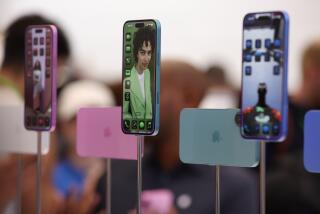Apple posts highest-ever quarterly earnings in a sign it tamed supply crisis

- Share via
Apple Inc. rallied in extended trading after quarterly revenue sailed past Wall Street estimates, marking a victory against a supply chain crunch fueled by the pandemic and chip shortages.
Sales climbed 11% to a record $123.9 billion in the fiscal first quarter, which ended Dec. 25, the company said Thursday. Analysts had predicted $119.1 billion on average. Profit also beat projections, and the company predicted that sales would grow by a double-digit percentage in the quarter that ends in March.
The surprisingly strong results suggest that fears of supply upheaval were overblown. Apple Chief Executive Tim Cook had warned late last year that shortages could cost the company more than $6 billion in sales during the all-important holiday period. But the tech giant navigated the crisis and benefited from a flood of new products, including the iPhone 13, Apple Watch Series 7 and updated Macs.
The shares rose as much as 5.8% to $168.38 in extended trading. Before the report, they had fallen 10% this year, hurt by a broader downturn. The stock gained 34% in 2021.
Follow a container of board games from China to St. Louis to see all the delays it encounters along the way.
Investors have been looking to Apple for reassurance after a recent rout battered technology stocks. Concerns about a sales slowdown and looming interest rate increases have made the sector less appealing in the last month, with Apple too suffering from the retreat. After topping a market value of $3 trillion in early January, Apple is now worth $2.6 trillion.
Earnings for the Cupertino, Calif., company rose to $2.10 a share in the first quarter, well above the $1.90 estimated by analysts.
On a conference call, Apple executives said supply chain constraints would ease further in the second quarter, though its rate of growth would decelerate for both the overall business and the services segment. Apple didn’t give a specific sales target, beyond saying it would be a record for the period. Analysts are predicting that revenue will top $90 billion. Gross margin will be 42.5% to 43.5%, Apple said.
The company also said there are now 1.8 billion Apple devices in use, up 300 million from two years ago. And it has 785 million paid Apple and third-party subscriptions on its platform, up from 745 million in the previous quarter.
The company generated $71.6 billion in revenue from its flagship product, the iPhone, beating Wall Street estimates of $67.7 billion. That’s up 9.2% from the year-ago quarter. The sales period represented the first full quarter of iPhone 13 revenue. On the company’s earnings call, Cook said the entire iPhone 13 line contributed to the strong growth, and he declined to specify whether the Pro models were stronger performers than the cheaper versions.
The phone began selling in September, several weeks earlier than the iPhone 12 did in 2020. Though the iPhone 13 was considered to be a modest update, users looking to upgrade to 5G service still clamored for the device.
“Supply-demand was largely in balance by quarter end, and China shipments were strong,” Bernstein analyst Toni Sacconaghi said in a note before the results were released.
The supply constraints hitting the iPhone 13 line and other new products, including the latest Macs and Apple Watches, resulted in shipment delays of several weeks. In Apple’s previous earnings report, the company said that the problems cost it $6 billion in sales — and warned that the holiday quarter would be even worse.
Against that backdrop, the results were a relief to investors. But not everything was rosy: Sales of the iPad were lower than projected. The company had said after its previous quarter that supply problems were hitting that product particularly hard. Japan also was a weak spot last quarter.
The iPad brought in $7.25 billion in the first quarter, compared with an estimate of $8.1 billion. The company launched the most significant iPad mini update in the product’s history and a minor refresh to its cheapest tablet during the quarter, but struggled to get enough supply to market. Chief Financial Officer Luca Maestri said that iPad shortages in the quarter were “pronounced,” and Cook said some constraints were the result of Apple reallocating key components to the iPhone.
“This is our eighth quarter reporting results in the shadow of the pandemic,” Cook said, “and while I can’t say it gets any easier, I can say I’m incredibly proud of the way our teams have come together.”
Apple generated $19.5 billion in services revenue in the first quarter, topping Wall Street expectations of $18.6 billion. The category grew 24% from a year earlier on strong App Store, Apple Music and iCloud subscription sales. Apple said this month that developers generated about $60 billion from the App Store during 2021, but it didn’t share specific App Store revenue for the company.
The wearables, home and accessories division — a unit that includes the Apple Watch, Apple TV, AirPods, Beats headphones and the HomePod — produced $14.7 billion during the quarter. That was up 13% from a year earlier and above the average estimate of $14.2 billion. The category got a boost from new AirPods earbuds launching near the end of 2021 after not getting a similar upgrade in 2020. The Apple Watch Series 7, however, faced a release delay and significant shortages.
The company also reported about $10.9 billion in Mac sales, beating the estimate of $9.5 billion. That was a 25% increase from the year-ago period. Apple launched a new MacBook Pro during the quarter that was well received by consumers and reviewers. Maestri said the majority of new Macs sold now have Apple-designed chips, rather than parts from Intel Corp.
The coming year could be even bigger in terms of new products. Apple is planning its widest array of launches ever, including a new iPhone SE and an iPad Air with 5G as early as this spring, Bloomberg has reported. There also could be updated Apple Watches, four new iPhones and multiple Macs coming in the fall.
On the call, Cook was asked his opinion of the so-called metaverse — a concept promoted by Facebook owner Meta Platforms Inc. and other rivals. Cook responded that Apple is investing heavily in augmented reality and noted that AR apps are already available on the iPhone. The company plans to launch a mixed augmented and virtual reality headset next year, Bloomberg has reported.
“We see a lot of potential in this space and are investing accordingly,” he said.
Bloomberg writer Ian King contributed to this report.
More to Read
Inside the business of entertainment
The Wide Shot brings you news, analysis and insights on everything from streaming wars to production — and what it all means for the future.
You may occasionally receive promotional content from the Los Angeles Times.











